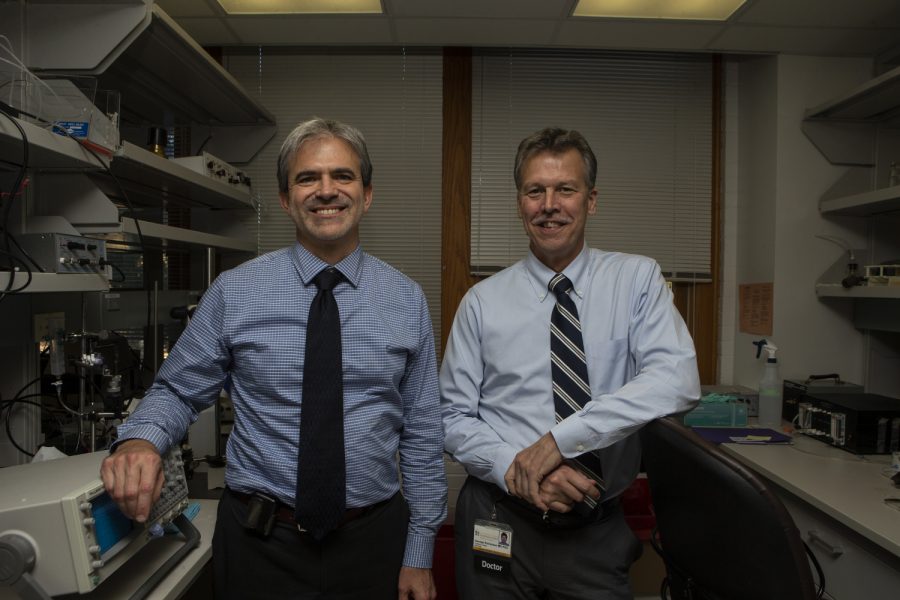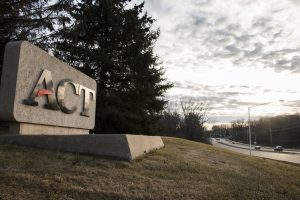UI doctors prepare to study obscure leading cause of death in refractory epilepsy
UI researchers are working to create a better understanding of the leading cause of death in refractory epilepsy cases.
Brian Gehlbach (left) and George Richerson (right) pose for a portrait in the Medical Laboratories on Monday, Oct. 7, 2019. Gehlbach and Richarson have received a three million dollar research grant to continue their research into epilepsy.
October 14, 2019
The leading cause of death in those who suffer from refractory epilepsy has been a mysterious topic in the field, but now researchers — including some University of Iowa doctors — are working to shed light on the subject.
This research team recently won a five-year $3, million grant to expand knowledge about Sudden Unexpected Death in Epilepsy.
UI Clinical Professor Brain Gehlbach, a physician on the study, said Sudden Unexpected Death in Epilepsy is not a result of traumatic injury.
“An autopsy, if performed, does not disclose an alternative cause of death,” Gehlbach said.
Neurology Department Chair George Richerson said epilepsy is more prevalent than people tend to realize. He said around one-and-a-half percent of people in the United States have epilepsy, and around one-third of them have refractory epilepsy.
The chances of Sudden Unexpected Death in Epilepsy are markedly worse for those with refractory epilepsy, Gehlbach said.
RELATED: UI epilepsy research forges ahead
“It’s the leading cause of death for patients with medically refractory epilepsy — patients who have to take multiple medications in an effort to control their epilepsy — but it’s still not totally controlled,” Gehlbach said.
Richerson said the chances of sudden, unexpected death rise alarmingly over time.
“If you have epilepsy, then the risk of dying from [Sudden Unexpected Death in Epilepsy] is about one in a thousand. If you have refractory epilepsy, it’s closer to one in a hundred [chance] per year,” Richerson said. “Over 10 years, that’s a 10 percent chance.”
Richerson said Sudden Unexpected Death in Epilepsy is not always readily apparent as a cause of death.
“It’s hard to prove that it’s [Sudden Unexpected Death in Epilepsy]. You have to prove that there’s not some other cause,” Richerson said. “It’s a diagnosis of exclusion.”
He said the lack of knowledge surrounding Sudden Unexpected Death in Epilepsy may also stem from confusion between it and sudden cardiac death — a much more common event.
RELATED: Epilepsy awareness
“There are studies that [show] not enough medical professionals even know what [Sudden Unexpected Death in Epilepsy] is, including medical examiners,” Gehlbach added.
A major component of their work is to study the breathing of individuals with epilepsy, researchers said.
“Our focus has really been on breathing and how it becomes abnormal after seizures,” Richerson said. “We’re not the only one that studies it, but we’re one of the major groups in the world really that have focused really strongly on breathing abnormalities after seizures. … It’s becoming more apparent that the problem is a breathing problem.”
Neurology Associate Professor Gordon Buchanan said part of the study will determine if body sensitivity to carbon dioxide changes during seizures, which could be critical knowledge in relation to breathing.
“Studies like theirs are exceptionally important,” Buchanan said.
Richerson said the team aims to identify which patients have the highest risk of dying, why this risk exists, and what happens during the seizure to result in death in order to work toward preventing a tragedy.
“Through our work we’ve met a lot of people that have lost a child, or a spouse, or a parent to [Sudden Expected Death in Epilepsy],” Richerson said. “Hearing their stories and seeing how it has affected their lives — losing somebody unexpectedly motivates us to try to solve this problem.”







